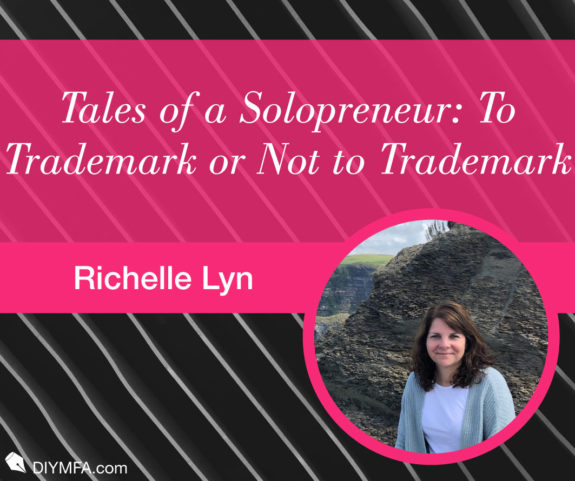Disclaimer: DIY MFA does not provide legal advice. In making decisions on whether to trademark your business name or any other decision that may have legal ramifications, we strongly urge you to speak to a licensed attorney in your specific jurisdiction for the most accurate information.
My first installment of Tales of a Solopreneur invited you along for a front-row seat to my solopreneur journey in real-time as I start a book coaching business. Some key areas I will focus on during my start-up process include development, design, brand, marketing, technology, systems, and launch.
There’s no perfect order to complete these items. Every solopreneur and their situation will be different, and each of these areas can run both broad and deep and become rabbit holes on their own.
Trying to tackle all of them at once can be overwhelming, which is why my plan is to break up the list into manageable tasks. My hope is that sharing my journey will provide you with frameworks and tips to help you if and when you design your own business.
This installment focuses on an important consideration after you select your business name—whether to trademark it or not.
The Name Game
Some people are lucky enough to have a business name epiphany—the perfect name that embodies their idea pops into their brain. Others spend weeks, months, or even longer trying to figure out that perfect name—going back and forth but nothing seems just right.
Regardless of which situation you’re in, it’s helpful to take a step back before you get stuck on a name that may not serve you in the long run. This is something I learned the hard way.
My Epiphany—Lost & Found Again
I had a name epiphany while brainstorming the pillars for my author platform, but I wasn’t ready to move beyond planning at that point. I was so excited about the name, and my excitement seemed to be sincerely shared by the few people I was comfortable sharing the name with…I can be a bit superstitious with these types of things.
I dragged my feet on locking in the name even though I knew all too well that time is of the essence with these things.
Fast forward a couple of years, and now my name epiphany—and my platform pillars—are the foundations for both my book coaching business and a nonfiction book project I’m researching. A trusted advisor urged me to protect my business name and brand now, so I didn’t lose my chance to use it later.
I finally reached out to an Intellectual Property (“IP”) lawyer to inquire about trademarking the name. I ran an updated website domain and social media search on the name in preparation for my first call with the lawyer. The .com website domain had been purchased in 2013 by a business consulting firm in Spain, which had also picked up some of the social media handles. But other than that, the name was nowhere to be found on Google; and the firm was providing very different services abroad than I was envisioning. So I thought I might still be in the ball game and was feeling good.
The lawyer and I started with a thorough intake call where we discussed my platform idea, my short-term and long-term goals for my business and brand, and my ideal business name. Then the lawyer recommended we move to the name search phase, so he could assess whether the name was available to trademark; and if so, whether there were any additional hurdles to address.
His research showed the name had not yet been trademarked although there was no way to tell whether there was a pending application for the same name, which is another reason why starting the trademark application process can be time-sensitive.
The research also showed that a retail giant had contested the use of other trademark applications that included a word that was used in both mine and the retailer’s name, including contesting its use by a coaching business with a similar type of name to what I was considering.
In my opinion, this coaching business would in no way ever be a competitor to the retailer.
However, at the end of the day that didn’t matter since the retailer has deep pockets and lawyers on staff and can file lots of paperwork to run up the costs and tie up the trademark application process for a long time.
My lawyer recommended I weigh the costs of a potentially long, expensive, and frustrating process to the benefits of sticking with the name before I decided what I wanted to do. Basically, did the name mean that much to me that I was ready to go toe-to-toe with a household name to trademark a business I was just starting and hadn’t made any money with yet?
Even though I believed my desired name and products and services—like the other coaching business before me—were different enough that it shouldn’t be perceived by the retailer as an infringement, I ultimately decided the likelihood of the retailer contesting and stalling my momentum was high enough. And this was not how I wanted to spend my time and money while I was trying to start my business.
I tweaked the name and settled on Mind Your Gap Trip, which is the Instagram handle and hashtag I have been using for myself for a couple of years. This name still reflects all of my platform pillars. And even though it wasn’t quite what I had been dreaming about, I believe it will suit me well in the long run.
To Trademark or Not
You obtain some protection over your name brand by using it in your business, but it’s limited to the specific geography where you’re providing your goods and/or services. A trademark, however, provides legal protection to your name brand on a national basis.
Trademarking is not required when you open your business. However, it should be on your checklist to at least consider whether it’s needed or desired. You can always choose not to move forward with this option.
Keep in mind that if you want to provide the most protection available to your name, products, and services using a trademark, you’re better off starting the process as early as possible.
If you are interested in learning more, the United States Patent and Trademark Office (“USPTO”) provides substantive information about trademarks and the application process for free at www.uspto.gov/trademarks.
If you think you might want to pursue this option, I recommend you speak with an IP lawyer up front since they will be able to help steer you in the right direction and identify possible pitfalls. The USPTO also provides information on contacting IP lawyers. The due diligence you and your lawyer do prior to preparing and filing a trademark application is key.
If you decide to move forward, the trademark application itself will be prepared by your lawyer with your input.
Once your application is filed, you will be in a sit-and-wait game for a while. Your lawyer may receive some information and correspondence related to the application that requires further action. The application process, for the most part, will be running in the background while you continue to set up and start your business, which is another reason why a timely filing is important.
You won’t know until you know whether your application is approved since there’s no way to know if someone else has filed a similar application that’s sitting in the queue already, and you don’t know who might contest your filing and whether they’ll be successful.
You don’t have to wait for the trademark approval to use the name, nor should you since you will have to show the USPTO you are using the name, goods and services that you’re requesting the trademarking for prior to your trademark’s final approval.
Only you can decide whether trademarking your business makes sense since everyone’s circumstances are different. However, don’t let your desire to avoid incurring expenses when you’re in start-up mode, especially when it’s linked to anything that involves lawyers, legal filings, and long wait times, prevent you from thinking long-term strategy at the outset.
I will admit that I was geeking out with the application process since I found it very interesting, but as a lawyer myself, I know all too well that most people do not feel the same way about legal filings.
Don’t let that hold you back if you think trademarking makes sense for you. A great lawyer can make the process less scary and relatively painless for you.
What’s Up Next?
My trademark application has been filed, so now it’s time for me to tackle something new—setting up my online platform. I’ve been putting off creating my website for way too long, so I’m finally dipping my toe into that next.
I hope this latest glimpse into my solopreneur journey continues to inspire you to dig a little deeper into that idea you can’t let go of and start your own journey.
Tell us in the comments: Where are you on your solopreneur journey? Have you selected your business name yet? Have you considered whether trademarking makes sense for you?

Richelle Lyn is a compensation & benefits attorney and HR executive, who now spends her days focused on the writing life. Her favorite fiction reads involve leading ladies who push boundaries and conquer their fears while preferably digging for secrets, learning magic, and/or saving the World. She’s also a fan of non-fiction reads focused on personal growth and transformation. She loves her tea hot and her coffee iced. She calls South Florida home, but her favorite place to be is on a trip. You can check her out on Twitter and Instagram.







